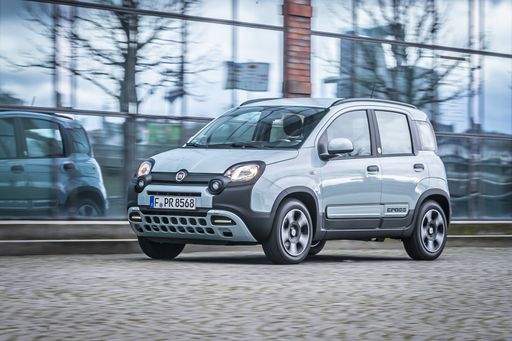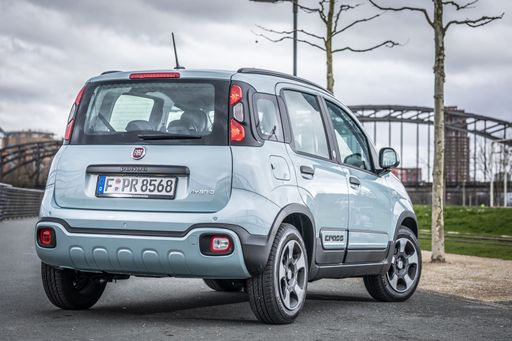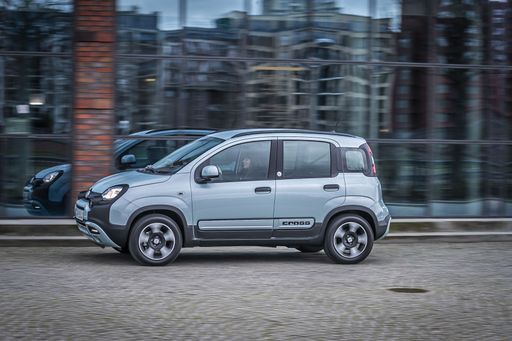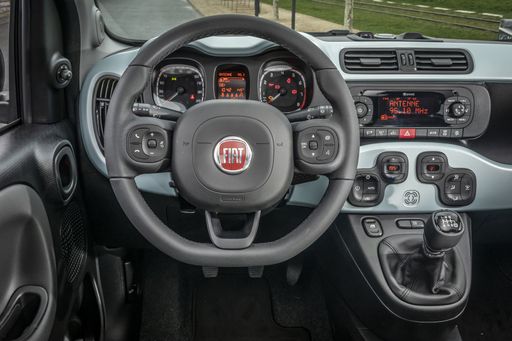Fiat Panda vs Hyundai Tucson – Performance, range & efficiency compared
Two cars, one duel: Fiat Panda meets Hyundai Tucson.
Which one wins in performance, efficiency and value for money? Find out now!
Costs and Efficiency:
Price and efficiency are key factors when choosing a car – and this is often where the real differences emerge.
Fiat Panda has a decisively advantage in terms of price – it starts at 14100 £, while the Hyundai Tucson costs 30600 £. That’s a price difference of around 16500 £.
Fuel consumption also shows a difference: Hyundai Tucson manages with 1 L and is therefore clearly more efficient than the Fiat Panda with 5 L. The difference is about 4 L per 100 km.
Engine and Performance:
Under the bonnet, it becomes clear which model is tuned for sportiness and which one takes the lead when you hit the accelerator.
When it comes to engine power, the Hyundai Tucson has a clearly edge – offering 252 HP compared to 70 HP. That’s roughly 182 HP more horsepower.
In acceleration from 0 to 100 km/h, the Hyundai Tucson is convincingly quicker – completing the sprint in 7.90 s, while the Fiat Panda takes 13.90 s. That’s about 6 s faster.
In terms of top speed, the Hyundai Tucson performs slightly better – reaching 194 km/h, while the Fiat Panda tops out at 164 km/h. The difference is around 30 km/h.
There’s also a difference in torque: Hyundai Tucson pulls significantly stronger with 367 Nm compared to 92 Nm. That’s about 275 Nm difference.
Space and Everyday Use:
Cabin size, boot volume and payload all play a role in everyday practicality. Here, comfort and flexibility make the difference.
Seats: Hyundai Tucson offers a bit more seating capacity – 5 vs 4.
In curb weight, Fiat Panda is significantly lighter – 1055 kg compared to 1520 kg. The difference is around 465 kg.
In terms of boot space, the Hyundai Tucson offers clearly more room – 620 L compared to 225 L. That’s a difference of about 395 L.
In maximum load capacity, the Hyundai Tucson performs decisively better – up to 1799 L, which is about 929 L more than the Fiat Panda.
When it comes to payload, Hyundai Tucson distinct takes the win – 545 kg compared to 365 kg. That’s a difference of about 180 kg.
Who comes out on top?
Overall, the Hyundai Tucson shows itself to be outperforms in nearly all aspects and secures the title of DriveDuel Champion.
It convinces with the more balanced overall package and proves to be the more versatile choice for everyday use.

Hyundai Tucson
Fiat Panda
The Fiat Panda is a compact city car that brilliantly combines practical design and efficient functionality. Its boxy shape provides ample interior space and visibility, making it a favourite among urban drivers. With its reputation for reliability and affordability, the Panda continues to be a top choice for those seeking a no-frills, dependable vehicle.
details @ media.stellantis.com
@ media.stellantis.com
 @ media.stellantis.com
@ media.stellantis.com
 @ media.stellantis.com
@ media.stellantis.com
 @ media.stellantis.com
@ media.stellantis.com
Hyundai Tucson
The Hyundai Tucson is a standout choice in the compact SUV segment, offering a perfect blend of style, comfort, and practicality. Its modern design is complemented by a spacious interior that provides ample room for passengers and luggage alike. With advanced technology and safety features, the Tucson ensures a smooth and enjoyable driving experience.
details @ hyundai.news
@ hyundai.news
 @ hyundai.news
@ hyundai.news
 @ hyundai.news
@ hyundai.news
 @ hyundai.news
@ hyundai.news
 @ hyundai.news
@ hyundai.news

|

|
|
|
|
Costs and Consumption |
|
|---|---|
|
Price
14100 £
|
Price
30600 - 46300 £
|
|
Consumption L/100km
5 L
|
Consumption L/100km
1 - 6.9 L
|
|
Consumption kWh/100km
-
|
Consumption kWh/100km
-
|
|
Electric Range
-
|
Electric Range
64 - 70 km
|
|
Battery Capacity
-
|
Battery Capacity
-
|
|
co2
113 g/km
|
co2
22 - 156 g/km
|
|
Fuel tank capacity
38 L
|
Fuel tank capacity
42 - 54 L
|
Dimensions and Body |
|
|---|---|
|
Body Type
Hatchback
|
Body Type
SUV
|
|
Seats
4
|
Seats
5
|
|
Doors
5
|
Doors
5
|
|
Curb weight
1055 kg
|
Curb weight
1520 - 1889 kg
|
|
Trunk capacity
225 L
|
Trunk capacity
546 - 620 L
|
|
Length
3635 mm
|
Length
4510 - 4520 mm
|
|
Width
1643 mm
|
Width
1865 mm
|
|
Height
1551 mm
|
Height
1650 mm
|
|
Max trunk capacity
870 L
|
Max trunk capacity
1721 - 1799 L
|
|
Payload
365 kg
|
Payload
525 - 545 kg
|
Engine and Performance |
|
|---|---|
|
Engine Type
Petrol MHEV
|
Engine Type
Diesel MHEV, Petrol MHEV, Petrol, Full Hybrid, Plugin Hybrid
|
|
Transmission
Manuel
|
Transmission
Automatic, Manuel
|
|
Transmission Detail
Manual Gearbox
|
Transmission Detail
Dual-Clutch Automatic, Manual Gearbox, Automatic Gearbox
|
|
Drive Type
Front-Wheel Drive
|
Drive Type
Front-Wheel Drive, All-Wheel Drive
|
|
Power HP
70 HP
|
Power HP
136 - 252 HP
|
|
Acceleration 0-100km/h
13.90 s
|
Acceleration 0-100km/h
7.9 - 11.6 s
|
|
Max Speed
164 km/h
|
Max Speed
180 - 194 km/h
|
|
Torque
92 Nm
|
Torque
265 - 367 Nm
|
|
Number of Cylinders
3
|
Number of Cylinders
4
|
|
Power kW
51 kW
|
Power kW
100 - 185 kW
|
|
Engine capacity
999 cm3
|
Engine capacity
1598 cm3
|
General |
|
|---|---|
|
Model Year
2024
|
Model Year
2024
|
|
CO2 Efficiency Class
C
|
CO2 Efficiency Class
E, F, D, B
|
|
Brand
Fiat
|
Brand
Hyundai
|
Is the Fiat Panda offered with different drivetrains?
Available configurations include Front-Wheel Drive.
The prices and data displayed are estimates based on German list prices and may vary by country. This information is not legally binding.
